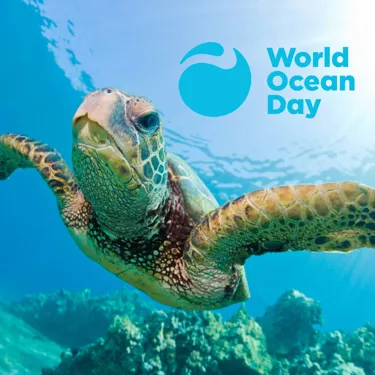5 things you can do to help our oceans this World Ocean Day
- Tuesday 7th June 2022

As World Ocean Day approaches on the 8th of June, you may be thinking – what small changes can I make to help protect our oceans for future generations? We’re here to help!
1. Reducing plastic usage
A large part of ocean conservation is about reducing the plastic waste found in our oceans. You can make small changes in your everyday life to go plastic-free and help to reduce waste. Any changes you can make are positive, such as buying a reusable coffee cup for your morning caffeine fix or changing your bathroom products to be plastic-free by using bars of soap or bamboo toothbrushes!
The good news is that its Plastic Free July coming up, so you can get involved and challenge yourself for the month! The website gives you tips on the changes you can make and even a quiz to help you decide what to swap out of your regular routine and set you up for success.
2. Composting
If you’re green-fingered or not, composting is an easy way to make a small change. Many councils offer home composting bins, where you can dispose of your food waste. Not only can this reduce the impact you have on the environment, but it can also save you money on your gardening and increase the nutrients in your soil!
Composting at home for one year can save global warming gases equivalent to the CO2 your washing machine produces in three months?! RecycleNow have all the information on how to begin your composting journey, have your plants thriving and do you bit to help save the planet!
3. Going fish-free
Like eating meat causes damage to our environment, eating seafood also has an immense impact on our oceans, with discarded equipment, overfishing and bycatching causing damage to the ecosystems. When done on a small scale, fishing can be sustainable, however most of the seafood we eat is caught on an industrial scale.
By eliminating or reducing the amount of seafood we eat, we can help to combat this and begin to restore the ecosystems of the ocean, as well as reducing the cruelty that comes from catching fish, such as shark finning.
4. Participate in a local beach clean!
For World Ocean Day, the Sea Life Trust are doing beach cleans across the world! The team here at Sea Life London Aquarium will be taking the city approach and will be doing a litter pick by the Thames.
Beach cleans help to reduce the plastic pollution found in our oceans, one of the core visions of the Sea Life Trust, to live in a world where oceans are healthy, properly protected and full of diverse life. If you aren’t around on World Ocean Day though, there are many charities that conduct beach cleans and it is worth searching for your nearest one and getting involved! Not only is it helping our oceans, it can also be a fun and sociable day out.
Recycle better
Most people are very familiar with recycling these days, but there is still a lot of confusion on how to sort our recycling and what can and cannot be recycled! Here are some top tips from the Earth Day organisation on how to recycle better:
- Plastic bags – Grocery bags are catastrophic for our oceans, dissolving into microplastics which fish ingest, or entangling fish. They are also hard to recycle as they get caught in equipment. When thinking about whether a bag can be recycled or not, if you can poke your finger through it, then it is best left in the normal bin! By using reusable bags, you can help to combat this.
- Small items – anything smaller than a credit card is too small to be sorted for recycling. Always check bottles on how best to recycle them (and their lids!) and make sure you’re not placing anything too tiny in the recycling bin.
- Clean your rubbish – ahead of recycling items, they must be clean, empty and dry. Be sure to rinse plastic jars or milk bottles. However, common fast-food containers such as pizza boxes cannot be recycled when they’re covered, I grease and can contaminate other products.
- Education – products that can be recycled varies between councils and depends on the area you live in. Make sure you research your local area to see what they accept, as well as seeing if there drop off points for anything that can’t be recycled kerbside (eg. Clothes, shoes, batteries etc.).